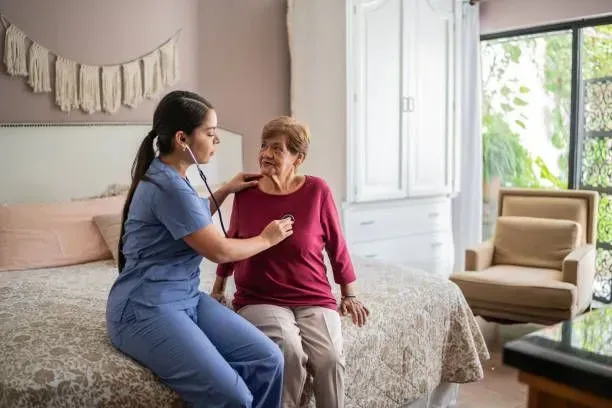Pneumonia: Causes, Symptoms, Risks, and Home Health Care Services
Pneumonia: Cause, Symptoms, Risks,
and Home Health Care Services
According to Cleveland Clinic "pneumonia is inflammation and fluid in your lungs caused by a bacterial, viral or fungal infection. It makes it difficult to breathe and can cause a fever and cough with yellow, green or bloody mucus. The flu, COVID-19 and pneumococcal disease are common causes of pneumonia. Treatment depends on the cause and severity of pneumonia."
Johns Hopkins adds "treatment depends on the type of pneumonia you have. Most of the time, pneumonia is treated at home, but severe cases may be treated in the hospital. Antibiotics are used for bacterial pneumonia. Antibiotics may also speed recovery from mycoplasma pneumonia and some special cases. Most viral pneumonias don’t have specific treatment. They usually get better on their own. Other treatment may include eating well, increasing fluid intake, getting rest, oxygen therapy, pain medicine, fever control, and maybe cough-relief medicine if cough is severe."

Are You Searching for a Home Care Agency Near Me
and HHA In-Home Care for Pneumonia?
Pneumonia, a common respiratory infection, can pose significant risks, especially for the elderly population. At 7 Day Home Care, a leading home care agency near you and serving Manhattan, Queens, Brooklyn, and Long Island, New York, we recognize the importance of awareness and proactive care for individuals susceptible to pneumonia.
What is the Causes of Pneumonia?
Pneumonia can stem from a variety of causes, ranging from bacterial, viral, and fungal infections to inhalation of certain chemicals or aspiration of food or liquids into the lungs. Bacterial pneumonia often occurs when bacteria such as Streptococcus pneumoniae, Haemophilus influenzae, or Legionella pneumophila enter the lungs and trigger an inflammatory response. Viral pneumonia, on the other hand, is typically caused by viruses like influenza, respiratory syncytial virus (RSV), or the novel coronavirus (COVID-19), leading to inflammation of the lung tissue. Fungal pneumonia, though less common, can result from exposure to fungi such as Pneumocystis jirovecii or Aspergillus, particularly in individuals with compromised immune systems. Additionally, underlying health conditions like chronic obstructive pulmonary disease (COPD), heart disease, or diabetes can weaken the immune system and increase the susceptibility to pneumonia. Understanding these various causes is essential for effective prevention and treatment strategies.
What are Symptoms of Pneumonia?
Pneumonia manifests with a range of symptoms, often varying based on the individual's age, overall health, and the underlying cause of the infection. Common symptoms include persistent cough, which may produce green, yellow, or bloody mucus, along with fever, chills, and difficulty breathing or shortness of breath, especially during physical exertion. Other notable signs include chest pain, particularly when breathing deeply or coughing, fatigue, and a general feeling of weakness or malaise. In older adults, confusion or changes in mental awareness may occur, while infants and young children may exhibit symptoms like rapid or shallow breathing, wheezing, vomiting, or refusal to eat. These symptoms can range from mild to severe, and prompt medical attention is crucial, particularly for vulnerable populations, to prevent complications and ensure effective treatment.
What are the Risks with Pneumonia for the Elderly
Elderly individuals face heightened risks when it comes to pneumonia due to age-related changes in the immune system and underlying health conditions. Factors such as frailty, decreased mobility, and impaired cough reflex can make seniors more susceptible to contracting pneumonia. Moreover, chronic illnesses like chronic obstructive pulmonary disease (COPD), congestive heart failure, and diabetes can weaken the body's ability to fight off infections, increasing the likelihood of developing pneumonia. Additionally, age-related structural changes in the respiratory system, such as reduced lung capacity and diminished mucociliary clearance, make it harder for the elderly to expel pathogens, leading to a higher risk of infection. As a result, proactive measures such as vaccination against pneumonia and annual influenza, practicing good hand hygiene, and avoiding exposure to respiratory infections become crucial for protecting elderly individuals from pneumonia and its potentially severe complications. Regular medical check-ups and prompt treatment of respiratory symptoms are essential for early detection and management of pneumonia in the elderly population.
The information provided in this article on pneumonia, including its causes, symptoms, and risks, is intended for educational purposes only. It should not be construed as medical advice or a substitute for professional healthcare guidance. Individuals experiencing symptoms of pneumonia or any respiratory illness should seek prompt medical attention from qualified healthcare professionals. Additionally, while every effort has been made to ensure the accuracy and reliability of the information presented, readers are encouraged to consult with their healthcare providers for personalized diagnosis, treatment, and care.
In-Home Care Agency Services Near You for Pneumonia
At 7 Day Home Care, we understand the importance of tailored care for individuals recovering from pneumonia. Our comprehensive in-home care services near you provide personalized support to promote recovery and ensure comfort for our clients. Our trained caregivers assist with medication management, respiratory treatments, monitoring vital signs, and providing emotional support. Additionally, we offer assistance with activities of daily living, meal preparation, and household chores to alleviate the burden on seniors during their recovery period.
Pneumonia presents significant risks for the elderly, but with proactive measures and appropriate care, recovery is possible. At 7 Day Home Care, we are committed to providing compassionate and personalized support to seniors recovering from pneumonia, ensuring their well-being and comfort in the familiar surroundings of their own homes. Call 516-408-0034 or visit 7 Day Home Care to learn about our affordable home care agency care near you in Manhattan, Queens, Brooklyn, Nassau County, and Suffolk County, New York.
Brian Callahan
7 Day Home Care


Living With Parkinson’s Disease: How In-Home Care Helps Seniors Stay Safe, Independent & Comfortable








